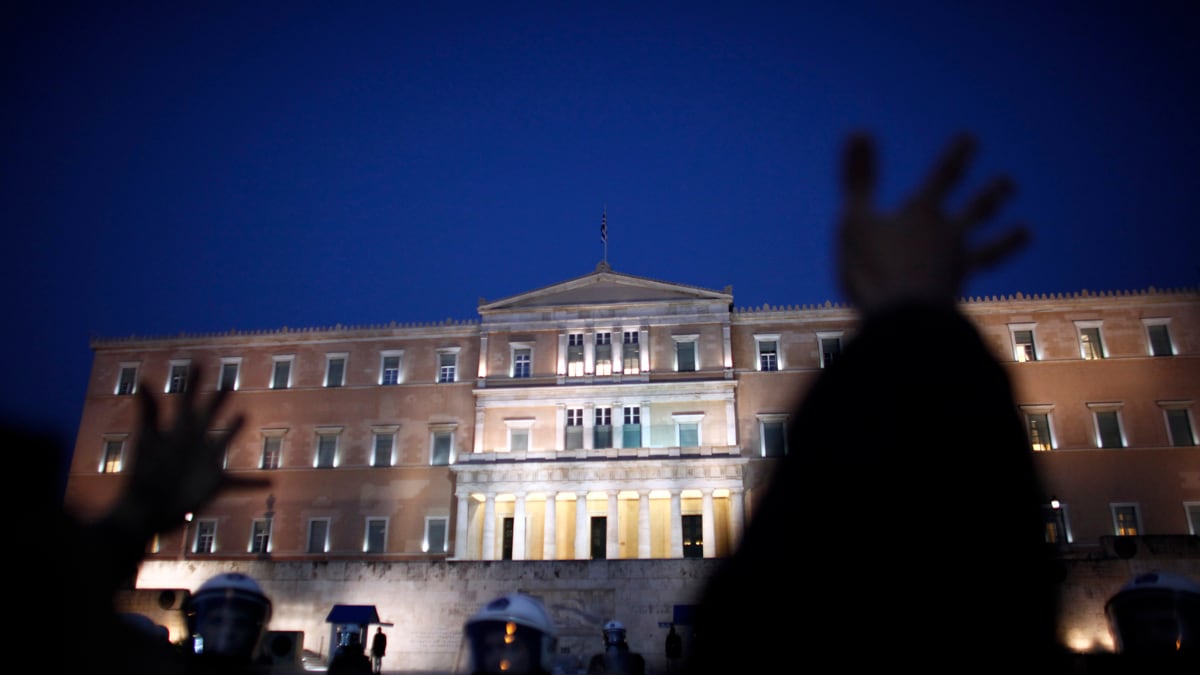Like most Greek tragedies, the current political and economic crisis playing out in Greece today is not likely to have a happy ending.
On Wednesday, the country’s technocratic leader, Lucas Papademos, dissolved Parliament and called snap elections, which will be held May 6. Papademos was appointed as caretaker of Greece in November when his predecessor, George Papandreou, resigned under pressure. In his five months in office, Papademos has passed unpopular austerity measures to qualify for European Union bailouts that have been met with an exodus of Greeks from the country, violent protests, and even a public suicide when retired pharmacist Dimitris Christoulas, 77, shot himself in the head in Athen’s Sytagma Square last week. According to the suicide note in his pocket, he was desperate because of his debts and Papademos-sponsored pension cuts.
The May election will not solve the country’s many and varied crises. In fact, many political analysts believe elections will mark the beginning of an intensely volatile period. The country’s two most popular political parties, the Pan Hellenic Socialist Movement (PASOK) and the New Democracy Party, which have led Greece for over a decade, are being edged out by older extremist parties and many new parties that have sprouted since the crisis began. Greece is in its fifth year of recession, and a poll on Thursday by Public Issue for Ekathimerini newspaper shows voters have little patience for the status quo. The young Independent Greeks Party, which was formed by a former New Democracy leader, is growing rapidly, polling at 11 percent. The Communist Party (KKE), Greece’s oldest political party, captured almost 12 percent in the poll, and the Coalition of the Radical Left (Syriza) won the support of 12.5 percent of Greeks polled. Meanwhile the former leaders are losing ground. New Democracy is polling at 19 percent and PASOK at just 14.5 percent.
“All polls indicate a political earthquake,” Janis Emmanouilidis, a senior policy analyst at the European Policy Center in Brussels told The Daily Beast. “Based on these polls, the Greek voters are heading toward a grand coalition, which makes sense from a politically logical point of view.”

There are now 10 parties with a realistic chance of getting enough votes to share power, says Roman Gerodimos, founder of the Greek Politics Specialist Group. Because large coalitions can cause even more instability when party faithful end up bickering with each over fine points, Gerodimos predicts that some groups will start forming partnerships and making deals ahead of the May 6 date. “Right now we’ll see protracted noise as these parties put forth their leaders to fill the power vacuum,” he told The Daily Beast. “But because the smaller parties lack political legitimacy, there will be a lot of confusion for the voters unless there is a swift deal.”
Gerodimos says that the snap elections were inevitable but that the country will suffer more by not waiting a little bit longer. “It will get worse before it gets better,” he says. “There is a brain drain, economic distress, and rather than moving in the right direction, campaigning leaders are unfocused and ineffective. Elections do have to take place, but the political system isn’t ready yet.”
For all the uncertainty ahead, one thing is clear—there is not one leader with enough backing to take over the country’s monstrous economic mess. Antonis Samaras of the New Democracy Party and Evangelos Venizelos of the PASOK are the best-known candidates. But neither leader is willing to step aside to share power in a broad coalition government, leading to speculation that an elected government will still need to appoint a neutral technocratic-style leader like Papademos to muddle through the economic crisis. “There are some who think keeping Papademos or a third person in power is the only answer,” says Emmanouilidis. “There are others who wish for a different kind of technocrat–someone weaker–to play to the parties. But a coalition dominated by tactics like that ultimately isn’t good for the Greek people.”
Samaras, who very much sees himself as the frontrunner, told the Greek newspaper Axia that it will likely take several rounds of voting to weed out the smaller parties and determine a true winner. “It’s blackmail to impose on a party that wins the election to govern with those who have lost,” he said. “That won’t just create a lack of governance, it will create a prolonged lack of governance, and that is exactly what we want to avoid.” But polls show that the New Democracy and PASOK parties combined would only get a third of the votes, which means negotiating with the smaller parties is inevitable.
Whoever wins, Emmanouilidis says he sees no sign that Greek voters want a government that will lead them out of the European Union despite the anger on the streets. Greece has been granted two massive bailouts from the European Union to try to solve their debt crisis, and many Greeks lament that they are being held hostage to countries like Germany, which has pressured Greece to pass harsh cuts to meet the strict rules attached to the EU’s bailout loans.
Dimitris Christoulas, the pensioner who took his life, summed up the sentiments of many in his chilling suicide note. “I see no other solution than this dignified end to my life, so I don’t find myself fishing through garbage cans for my sustenance. I believe that young people with no future will one day take up arms and hang the traitors of this country at Syntagma Square, just like the Italians did to Mussolini in 1945.”
Still, Emmanouilidis says, a large segment of the Greek population wants to stay within the EU and is ready to do what it takes, even if it means more austerity. “Being ‘ready to do what it takes’ is a big task,” he says. “But early polls show support for staying with a government that makes the EU requirements a priority. But of course anything could happen. Political logic does not always follow regular logic.”





